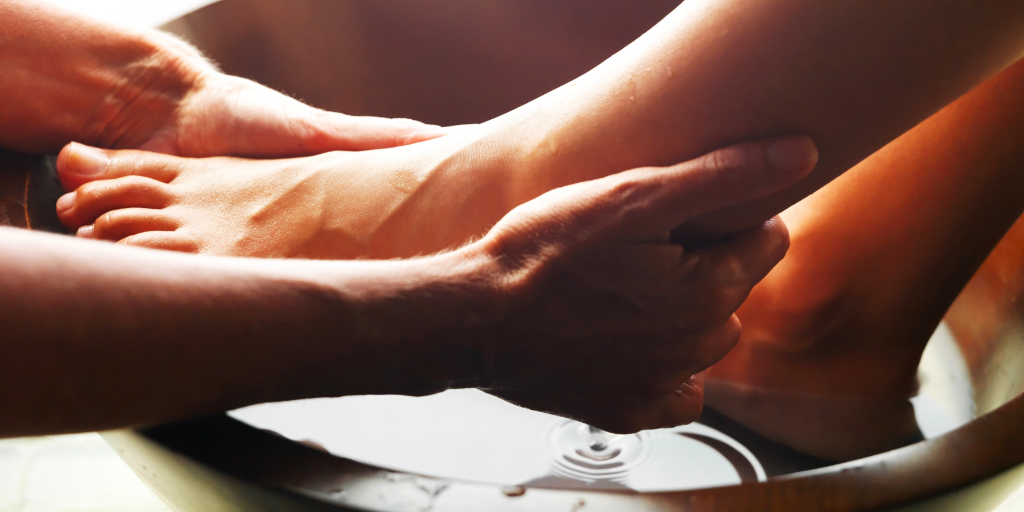
Caroline Godin contemplates the humility and holiness of washing feet (and other unpleasant tasks) for those in need.
As a child, I found the Holy Thursday tradition of the priest washing feet a bit strange. I eventually learned its meaning and accepted it; however, I never truly understood until recently.
Why Did Jesus Wash Feet?
“Master, are you going to wash my feet?” (John 13:6)
Peter had a hard time accepting that the Lord would stoop so low as to wash his feet. This was a task for the lowest of servants and he didn’t understand what Jesus was doing. Jesus told us that the greatest among us is our servant (Matthew 23:11). In a world where the highest of (earthly) kings was surrounded by attendants and hardly needed to lift a finger, this notion rocked their thinking. Jesus sets a new example of using authority and power not to command but to serve.

Those around us who need help — old and young, sick and poor — are unable to meet their own needs. Our more capable hands are called upon by the example of Jesus to reach out and serve where they cannot. Washing feet may seem unpleasant, but for the disciples who did not understand where they would tread and how they must go, they needed Jesus to prepare them. They could not do it themselves. We must also do for others what they can’t do for themselves. This is our call to holiness.
Allowing Your Feet to be Washed
“You will never wash my feet.” (v.8)
Peter rightly felt unworthy in the presence of the Lord, but it was the Lord’s help he needed in order to prepare for his mission on earth. It’s difficult to imagine how it must’ve felt for Christ to stoop down to wash the feet of a servant, yet Peter was asked to allow this.
Do we allow others the opportunity to serve us? Do we allow ourselves to receive their service? If Christ washed feet and Peter was called to let his feet be washed, let us serve one another and not let pride get in the way. Humility is called for both sides. This leads to gentleness, kindness, and holiness.
Enough
“Master, then not only my feet, but my hands and head as well.” (v.9)
Peter realized the importance of Jesus washing his feet and instantly wanted to be more fully cleansed. I don’t think it was out of greed but rather a lack of understanding. Peter was thinking physically; if the feet must be made clean, then all of oneself must be made clean. He was still grasping the Lord’s concept. The feet lead you on your road. The Lord will only request of you what is necessary; ask no more.
I sometimes feel conflicted that, while I stress over all I do for those I love, it’s not enough. I might be stretched thin, but I know they need more — and I struggle with whether or not my efforts are good enough. Then I remember that His grace is enough (2 Corinthians 12:9). I have to allow myself rest as well and let go of any guilt. Do enough and let go. This is peace which leads to holiness.
Washing Others’ Feet (and Other Unpleasant Tasks)
“If I, therefore, the master and teacher, have washed your feet, you ought to wash one another’s feet.” (v.14)
If Jesus washed feet, then we must wash feet. We must bend down to the unpleasant odor and dirt of lowly places. We must change stinky diapers, patiently listen to repeated stories, and run excess errands. We must patiently listen through tantrums, reassure for the umpteenth time, and rush to the rescue for the smallest of tasks. Babies, teens, elderly, sick, handicapped, disabled, it doesn’t matter. If the least of these need their feet washed — or anything else — we are called to be Christ to them.

And when He calls you to it, be sure to allow others to be Christ to you as well. Humility and holiness go hand in hand.
Share your thoughts with the Catholic Mom community! You'll find the comment box below the author's bio and list of recommended articles.
Copyright 2025 Caroline Godin
Images: Canva
About the Author

Caroline Godin
Caroline Godin is a freelance writer, catechist, and martial artist. She is married with 3 children. She enjoys finding new house projects to start and never finish and going camping. She takes a light-hearted view of life and keeps her eyes on eternity. One day, she may be the patron saint of ADHD or procrastination, if she gets around to it.


.png?width=1806&height=731&name=CatholicMom_hcfm_logo1_pos_871c_2728c%20(002).png)
Comments